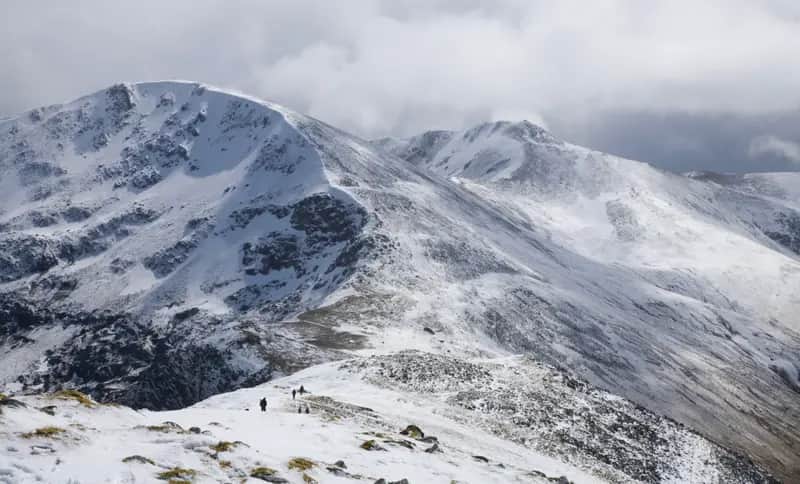DARK LOCHNAGAR AND A WILD NIGHT FOR THE HUNTER'S MOON

ALIEN SKIES: The cloud takes on a deep orange glow just after sunset during a traverse of Lochnagar for the full moon

RED SKY AT NIGHT: Lochnagar
WE were hoping to catch a clear night on Lochnagar for the full moon and for a couple of hours it looked promising.
This mountain jewel of Royal Deeside seemed a perfect choice for the Hunter's Moon. Even the monarchs of the glen were roaring out their approval.
In the end, however, we were treated to an acted out version of Lord Byron's seminal poem Dark Lochnagar, with its gales, stormy mists and tempests. I suppose you could call it a form of poetic justice.
I was joined on this expedition by long-time mountain pals Robert and Susan. Robert was the first person to brave my night walks many years ago, while Susan, now a Munro 'compleatist', was making her long-awaited debut in the darkness.
We had driven along to the car park at Loch Muick while most others were heading out and those still there preparing to do so. The wind was almost symphonic in its sweep through the trees, but the forecast was for an easing of the gales that had been with us all week. It was also suggested the strongest blasts would not be over the summits.
It was certainly breezy as we took the track west, but the top of the mountain was visible, just an irrelevant, wispy intrusion of cloud hanging around. The horizon behind us was calm and beautifully backlit, the autumn shades morphing through subtle layers. The one ahead was darker, but once we reached the levelling of the track the sudden change was breathtaking.
The mountain heights were now black silhouettes, and the high dappled cloud under the blue canvas was throbbing red and purple and yellow jagged veins were stitching it all together. A matter of minutes later and it had changed again, this time to softer toned waves of ochre on a pale blue background.
Behind us, the sky had taken on the look of a portending alien invasion, roiling clouds burned orange in their turbulence. My excitement was building at what we would find when we reached the loch higher up in the corrie.
Except, with the flick of a switch, it was gone. At one point, there was a glow in the distance, the moon appearing like the eyeball of a great beast slowly opening one eye, but it quickly slammed shut again. All we had now was darkness, so much so that we were already climbing the rock staircase known as The Ladder without realising we had risen so far. We were also taking a battering.
The corrie bowl was being scoured by the wind, the inability to escape its confines increasing the power of the maelstrom. The result was an unpredictability of where the next blow would come from.
We were like mismatched boxers, taking punches from one direction and then when we tried to compensate, to ready ourselves for the next punch, it would land from another improbable angle. We were being knocked back and forth, at some points off our feet.
We were a little punch-drunk when we topped out, but it was calmer here and we decided to push on. The path curved round to the north as it rose to the plateau but this was easier walking despite a drizzling mist blowing across, and it wasn't until we reached the summit rocks that we felt the strength of the wind again.
As we made our way back off the plateau, the moon made a fleeting appearance above the huge cairn on Cac Carn Mor and we raced over to capture the moment, but it didn't hang around. The visibility was now zero, the wind and the light moisture reducing the scope of our head torches, and we went off line a little.
We had been following a phone app map, but had also backed this up with map and compass readings. The importance of this was underlined when the phone died suddenly with the battery seemingly affected by the cold and we found our way back to the path further down by compass.
A few hundred feet down and we were out of the worst. A few hundred feet more and we were starting to enjoy the breeze as respite from the extra layers we had needed higher up.
The random gusts continued though, some of the strongest of the night coming as we dropped past the series of waterfalls and neared the lochside. There seemed no rhyme nor reason to these winds.
The clarity of the night was impressive, the shapes and contours standing out in all directions, but hopes of a late appearance from the moon shining on the waters of the loch came to nothing.
Dark Lochnagar had lived up to its billing. We had felt the potential of the tempest but it could have been much worse.

